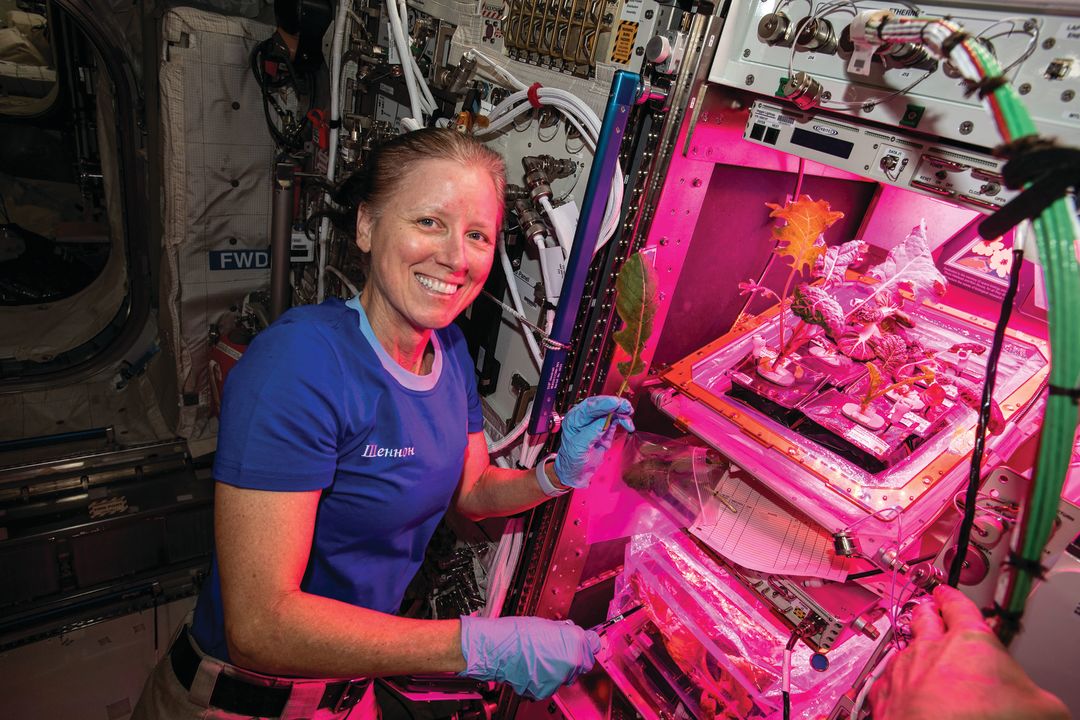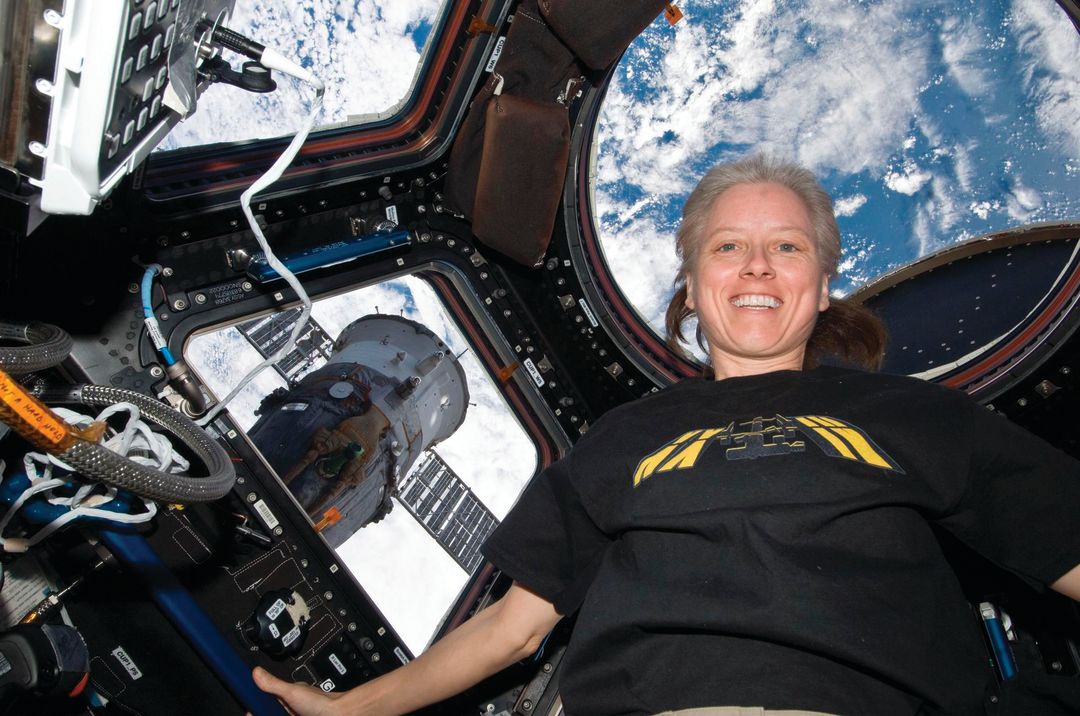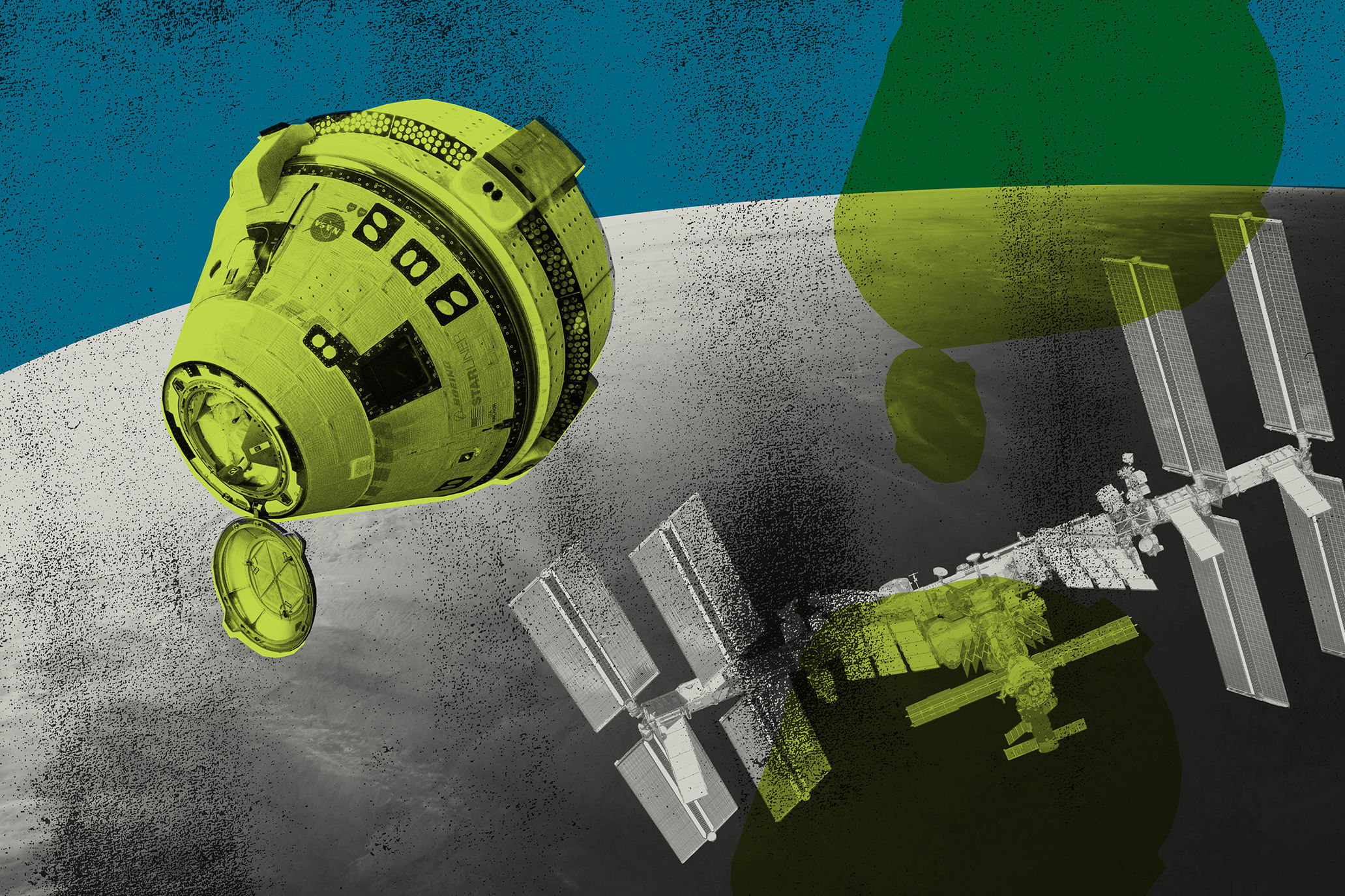Meet The First Houstonian In Space

Shannon Walker collects leaf samples from plants growing inside the European Columbus laboratory.
Image: NASA
The first time Shannon Walker went to space in 2010, she was strapped into the Russian Soyuz rocket about 2.5 hours before launch. As the pilot, she had to wait, but she then heard the fuel begin to flow, the rocket’s bowels moving below her, and her heart raced.
“I just got the biggest grin on my face,” she recalls to Houstonia, “because I’m finally, finally, finally getting to go into space.”
Growing up in Westbury in the 1960s, Walker always wanted to be an astronaut. She’d take field trips to NASA and put Apollo 11 stickers on the kitchen chair. After studying physics at Rice University, she spent almost her entire career at Johnson Space Center.
She developed robotics, was a flight controller, and worked in the Mission Evaluation Room—if something broke on the International Space Station, it was her job to find a solution. “It was out of that job that I was finally selected to be an astronaut,” she says.
Once she was selected, Walker spent years training and waiting, before her 2010 mission, where she spent 163 days in space. After another decade, she launched back out to space last fall, spending 168 days in orbit, becoming the first Houstonian to command the ISS, before returning last May.
Houstonia chatted with Walker about life off-world, her recent mission, and the future of spaceflight.
What are your first memories of space? I had just turned four, and that was when we first landed on the moon. My parents took me and my older sister out into the backyard, and the moon was rising over our house. My parents told us that we had people there now. And at that age, I thought that was kind of like the best idea ever. So ever since that time, I wanted to go into space.
How did you feel when you finally became an astronaut in 2004? It was amazing, because at that point, I had gotten to the final interview stages five times over a period of 14 years from when I put my first application in to be an astronaut before I was selected. So, finally, finally, finally, getting to be selected was stunning—unbelievably exciting to have them finally say, “yes, we’re ready to take you now.”
Can you walk me through a day in the life on the International Space Station? We wake up about six in the morning—we operate the station on Greenwich Mean Time—so we’re five or six hours ahead of Houston. So, you get up, you have breakfast, you get dressed, do your hygiene, whatever, brush your teeth, brush your hair. About 7:30 is when we check in with the ground. And we talk to all the control centers around the world. … We all check in, they give us any information that we need to know for the day, and then we go off and do our work.
Any free time you have, but you really don’t have a lot of free time, you’ll probably taking pictures out the window, spending time looking out the window, or communicating with your friends and family on the ground. It’s very full days.

Back In 2010, Shannon is pictured near the windows in the Cupola of the International Space Station.
Image: NASA
What does the earth look like from up there? Just the colors that the earth has is stunning: the greens of the forests and the reds that you see in Australia and the sand dunes in Northern Africa and the rivers and the blues—just the deep blues, say, in the Bahamas are absolutely gorgeous in space. So many interesting things and weather patterns and clouds and rivers and runoff from the continent out through the rivers—it’s just so fascinating to see.
On your last mission, you became the first Houstonian to command the space station. What did that mean to you? It’s so funny because it was a surprise that that was going to happen. We had a Russian commander when we launched to the station, and we were going to hand over to the next Russian commander. So, it was totally unexpected. But the way the launch and landing cycles worked out, that direct handover—I guess people on the ground didn’t want to do that so I was made commander for a very short period of time. Actually, I think it was 12–14 days, something like that, until the next commander could take over.
With companies like SpaceX, Virgin Galactic, and Blue Origin, there’s a lot going on in space right now. Any thoughts? In the next few years, I think it’s going to change dramatically on how people get to space and what people do in space, which I think is awesome. We really, really are at this inflection point on how we utilize space, which I think is really cool. … I think from all of that, there will be an economy developed in space, whether it be going to do stuff on the moon, or mining asteroids, or whatever—I really think it’s going take off and we’re going to live in the science-fiction life hopefully sooner rather than later.
What’s next for you? I’ve been working at Johnson Space Center and for NASA for many years, and so realistically I am approaching the end of my career horizon, and so I do not really expect to go back into space, which is fine. There are so many different things going on now—you know, would I love to go to the moon? You betcha. Do I think I will have an opportunity to go to the moon before I will retire? I don’t think I will. I think really what’s next for me is to help prepare the next generation of astronauts that we have—our current astronauts and the new ones that we’re going to hire—work to get them ready for what we will be doing next.
What do you love about space? What do I love about space? Wow, lots of things. I love being in space, because it’s a lot of fun and a fascinating place to live and to work, and it’s amazing to see the earth from that vantage point. I love the fact that the work we do in space truly is for the benefit of humankind. I think it is pushing humankind forward in a good way, and so just being part of something that is so much bigger than myself and really big and important for the earth is … I love being part of that.
This interview has been lightly edited for length and clarity.




